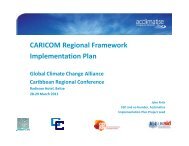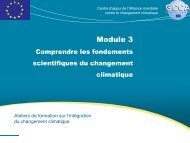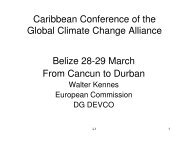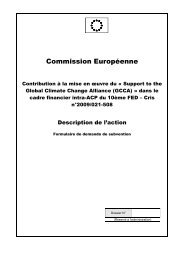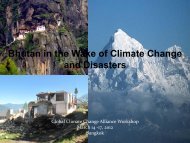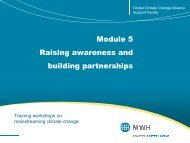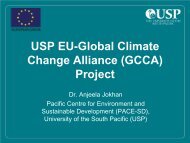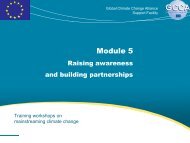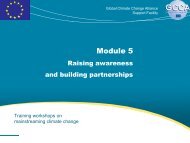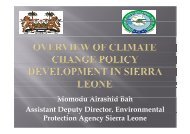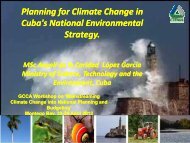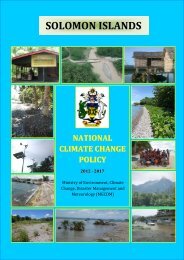Rwanda Green Growth Strategy 18nov11 - Global Climate Change ...
Rwanda Green Growth Strategy 18nov11 - Global Climate Change ...
Rwanda Green Growth Strategy 18nov11 - Global Climate Change ...
You also want an ePaper? Increase the reach of your titles
YUMPU automatically turns print PDFs into web optimized ePapers that Google loves.
Detailed Programmes of ActionProgramme 8: <strong>Climate</strong> Compatible MiningResponsible Stakeholders (lead in bold)MINIRENA, RNRA, private sector, KIST, PSF, MININFRA, EWSA, FECOMIRWA (federation of cooperatives)Summary of Programmes and ActionsThe <strong>Rwanda</strong> Mining Policy has five strategic pillars that support the growth of the mining industry. If thispolicy is considered ‘business as usual’ for the next decade, then mining is likely to contribute significantly toenergy use, GHG emissions and water use in <strong>Rwanda</strong>. A sixth strategic pillar – low carbon, climate resilientdevelopment – will be added to the Mining Policy with the aim of reducing GHG emissions and improvingenergy security and water security through energy efficiency, renewable energy, good water managementpractices and capacity building. Action 1: Energy EfficiencyEnergy efficiency reduces operating costs and therefore is an attractive approach for the private sector.<strong>Rwanda</strong>’s first step to improving efficient energy use will be to start measuring and reporting energy usageby source on a monthly basis. Measurements can also be used to calculate GHG emissions for the industry,and will help with national energy supply planning. Once a baseline is determined, <strong>Rwanda</strong> will set energyintensity reduction targets. Energy efficient technology will be implemented where financially viable,supported by the UNEP-Risoe Technology Transfer Programme. Electricity tariffs could also be negotiatedwith the private sector to incentivise off-peak use. Action 2: Renewable EnergyElectricity is usually the largest source of GHG emissions in mining. If it can be sourced from cleanrenewable energy, then the industry can transition to low carbon. <strong>Rwanda</strong> is developing 900MW of largescalegeothermal, hydro and methane, to phase out oil and become energy secure. Mining operations usingelectricity from the national grid will therefore become low carbon. Mining operations could also install onsiteelectricity generation such as solar PV and micro-hydro. These technologies have high upfront capitalcosts, but provide greater reliability, essential for large operations, and reduce operating costs. Action 3: Water ManagementGood water management reduces water demand and improves water quality which contributes to watersecurity in the catchment where the mining operation is located. It can reduce energy use, and thereforeGHG emissions, required for pumping water around an operation. <strong>Rwanda</strong>’s first step to good watermanagement will be to start measuring and reporting water inputs by source, usage and discharge on amonthly basis. These measurements will form the basis for a site water balance and can contribute todistrict and national water supply planning. Once a baseline is determined, water efficiency measures will beimplemented. These include using water efficient technology and technology transfer, supported by theUNEP-Risoe Technology Transfer Programme. Grey water could also be reused, although water treatment isrequired to provide potable water and to process water before discharge to rivers. Another important aspectof water management is risk reduction for flooding, which includes hazard mapping, drainage and pumping,early warning systems and site design. This should be done with the local community and government. Action 4: Capacity BuildingThe Mining Policy already addresses the need for capacity building in the mining sector and technicalassistance is underway. <strong>Rwanda</strong> will expand this programme to cover climate change impacts and lowcarbon development. Engineering courses are required, and mining-specific needs will be addressed witheducation and training. Mining companies can implement simple employee awareness programmes. TheGoR will immediately join the Intergovernmental Forum on Mining, Minerals, Metals and SustainableDevelopment (IGF) to learn from other countries. It should further investigate setting up a regional forum forMining and Metallurgy to foster capacity building in the region.70Government of <strong>Rwanda</strong>



